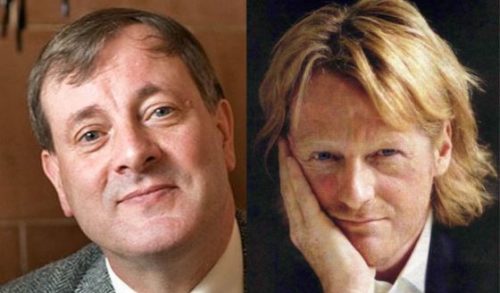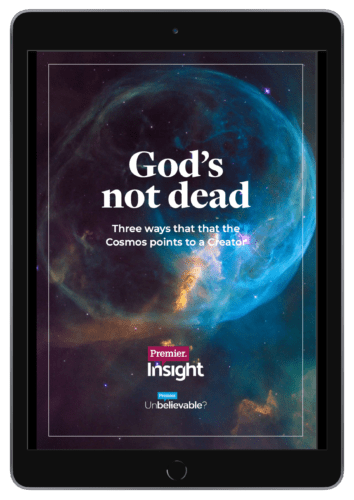
Strawmen are a fire hazard: I’m glad New Atheist dogmatism is on the wane
Posted:After listening to a Christian and an atheist debate from the days of The New Atheism, Erik Strandness asks how do we nurture civilised and thoughtful dialogue between differing worldviews, and what role models should we look to?
Unbelievable? recently presented a classic replay debate between atheist philosopher Stephen Law and Christian theologian Alister McGrath regarding Alister’s book ‘Why God Won’t Go Away.’ One of the most fascinating aspects of the show was their discussion of why both Christianity and Atheism frequently generate more rhetorical heat than intellectual light.
Flammable Strawmen
Cultural siloing, instead of promoting dialogue, has resulted in groupthink. Instead of arranging parley it promotes polemic. It brings like-minded people together in lecture halls to have their ears scratched by teachers who suit their passions and then leaves them hot under the collar stoked by the oratorical flame of their heroes and fueled by the chaff of their enemies. Sadly, in the end, nothing changes. The events temporarily breathe new life into their deeply held presuppositions, but they go home unchanged, inhaling the same metaphysical air, living with or without God.
Atheists and Christians need to be aware that every time they treat their opposition like a highly flammable strawman, they create a fire hazard. Both sides need to proceed with caution because when you play with rhetorical fire you may just set your own village ablaze and when the smoke clears find your once glorious evidential firestorm has been reduced to smoldering embers.
Worldview Arsonists
I was raised in a Lutheran home and accepted my identity as a Christian without ever exploring my faith. It wasn’t until my 40’s that I began to ask some hard questions about Christianity. I wanted to make sure I wasn’t being deceived so I read books by the “New Atheists,” Richard Dawkins, Christopher Hitchens and Sam Harris. Sadly, I found that every time I tried to see their atheistic point of view, they poked me in the eye for being religious. Here I was trying to become informed, smart, and lucid and ask serious questions about science and faith and yet was accused of being ignorant, stupid, or insane (or wicked, but I’d rather not consider that). Inexplicably, they alienated the very people they wanted to convert.
It’s certainly reasonable to make our apologetic pyrotechnic show as dramatic as possible but let’s make sure that our fireworks are “safe and sane,” because if we don’t then we are nothing more than worldview arsonists. McGrath summarized the problem this way:
“There’s a certain fringe element to both our movements which I think we might prefer to do without. I think that’s very important to say we must never define a movement by its fringes, by its mavericks, by its fanatics, when there is a kind of center which is much more stable and sensible.” (McGrath)
Notching Our Belts
Another way atheists and Christians try to deal a death blow to their opponents is to make them into statistical strawmen. In his book God is not Great, the late Christopher Hitchens proclaimed, “Religion poisons everything.” He dogmatically pointed to all the atrocities committed by the church and neglected to fully disclose those committed by atheists and agnostics. He seemed to think that a body count was an adequate litmus test for the existence of God, but the only thing I took away from his book was that human sin was statistically significant.
The vast majority of people acknowledge that the world has a problem and are quick to offer a detailed forensic sketch of the perpetrators. The united voice of those who acknowledge a world problem are dwarfed by the diversity of the possible suspects. In our haste to find the guilty party, we myopically point our fingers at Republicans or Democrats, environmentalists or capitalists, socialists or dictators, Atheists or Christians, and even rock ’n’ roll or disco. The problem for mankind is that at the end of every pointed finger is a human being. It’s easy to justify rhetorical wars when we belong to a tribe but much harder once we acknowledge the enemy within.
The Difference Unbelievable? Makes
Sadly, we all too often create images of our opponents from internet mud rather than divinely inspired dust. Unbelievable? puts a human face on those with whom we disagree.
It helps us love our enemies and pray for those who persecute us by helping us to get to know them personally. We see their human side and recognize them as fellow image-bearers, and while we may disagree with their ideas, we discover that they are rather pleasant human beings who would make for very interesting conversation partners over tea or coffee.
While most Unbelievable? listeners are Christians, there is a contingent of thoughtful, kind, and articulate atheists and agnostics who are willing to sit down with believers and discuss important faith questions. While I hope that they will one day form a relationship with Jesus, I am grateful that they have become the parry to our gospel lunge and the sandpaper to our often-prickly evangelism.
The “New Atheism” seems to be on the decline. Christians have pointed out that the reason for its flagging popularity is because it hasn’t offered any new arguments but just turned up the volume on the old ones to a Spinal Tappian 11. I would, however, suggest that part of its demise may be due to shows like Unbelievable? where more thoughtful and less strident Atheists are given the opportunity to engage respectfully with Christians. Brierley, in his role as wizard, shows us that the strawmen do in fact have brains and transforms what was once a flammable situation into a collegial campfire conversation.
Spitting Mad or Thirsty?
Maybe we would be better served if we saw those we disagree with as thirsty rather than spitting mad. It’s noble to hydrate the thirsty but ignoble to poison the waters. Well intentioned atheists and Christians motivated by an intellectually arid landscape should be encouraged to thoughtfully irrigate the hard-hearted terrain. However, when they adopt a scorched earth policy their tongues become flamethrowers and the world experiences emotional global warming.
How great a forest is set ablaze by such a small fire! And the tongue is a fire, a world of unrighteousness. The tongue is set among our members, staining the whole body, setting on fire the entire course of life, and set on fire by hell. (James 3: 5-6)
Philip Yancey, in his book Soul Survivor, offers some helpful advice about how we can change the way we perceive those with whom we disagree. His insight came after a conversation with renowned priest and theologian Henri Nouwen.
Through Nouwen’s eyes, I saw a new way to look at such people: not as immoral and ungodly but as thirsty – as people dying for love. Like the Samaritan woman at the well, they had drunk their fill of water that did not satisfy. They needed Living Water. After that conversation with Nouwen, whenever I encountered someone whose behavior offended or revolted me, I would pray, ‘God help me to see this person not as repulsive but thirsty.’ (Philip Yancey)
Examining Life
Anyone who takes a stand on an issue can be assured that he or she will face some blow back. If, however, their position is well thought out and they are willing to engage in civil discussion then everyone wins. Unfortunately, the postmodern mind confuses the shining light of reason with the match of an arsonist.
Thankfully, Unbelievable? pushes back by demonstrating that our beliefs aren’t safe spaces where we shelter in place from trigger words, but intriguing realms of ideas sparked by thoughtful dialogue. Unbelievable? continues to be a leader in thoughtful religious dialogue and a model for constructive cultural interaction. Socrates said an unexamined life is not worth living so let’s continue the dialogue so that neither side commits intellectual suicide.
Erik Strandness is a physician and Christian apologist who has practiced neonatal medicine for more than 20 years.
Listen to the Unbelievable? episode: “Why God Won’t Go Away” Alister McGrath vs Stephen Law

